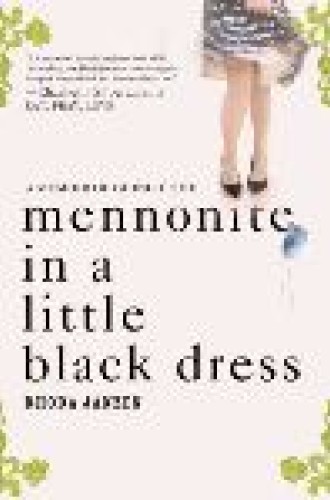Nightwatch/Mennonite in a Little Black Dress
That an adult convert to a religious community of plain people would look more generously on the group than someone who grew up in one and then left it is not surprising. Robert Rhodes, author of Nightwatch, a memoir about the six years he and his family spent in a Hutterite colony, treats his former community with a respect and restraint that is absent from the prose of Rhoda Janzen in Mennonite in a Little Black Dress, a memoir about leaving her Mennonite Brethren home and then returning to it years later. Unlike Rhodes, Janzen has all of the clunky memories of otherness—of wearing homemade clothing, being forbidden to dance, taking borscht to school for lunch when other kids brought Twinkies—but none of the agency of having chosen such difference for herself.
It is also not surprising that a man reflecting on his time as an adult in a “religious Alcatraz” (as some of Rhodes’s friends dubbed his new home) would craft a more positive account than a woman who spent her girlhood in one. Rhodes and his wife ultimately left the Hutterites because of concern for their daughters’ limited future in the colony, but his own years there were marked by the freedom to write and speak about his experience to outsiders, to hold deep conversations about history and theology with colony leaders, and to help with the editing of Hutterite sermons. Janzen, on the other hand, writes about a close-cinched Mennonite girlhood; when she later applied to seminary as a young adult, she found that only one other female student was enrolled.
Still, because these two memoirists are writing about such proximate religious and emotional territory—about peace-church communities and decisions to leave or stay or return to them, about loneliness and belonging, identity and spirituality—one might expect that they would have found some common literary or spiritual turf. But the two memoirs could hardly be more divergent. Rhodes’s voice is as earnest as Janzen’s is comic; his stance is that of a participant-observer, while Janzen claims an insider’s prerogative to poke fun. If Janzen’s prose is like those little red cinnamon candies—zingy, tart, but swiftly dissolving—Rhodes’s is more like a slice of whole-grain bread: wholesome, a little bland, but something you can chew on for a long time.
Rhodes and his wife joined the Hutterite Starland Colony in Minnesota in 1995, giving up their careers to “live without television or fashionable cars among a people who speak an archaic Austrian dialect and wear a blackcentric wardrobe.” Rhodes does not explain their reasons for joining with much specificity; he simply says that after he experienced a spiritual awakening from agnosticism, “we felt it was required of us to leave behind the ambitions and goals we had always pursued and to look for something much more fundamental.” So, to the consternation of family and friends who considered their move an “act of total madness,” Rhodes and his wife joined the 500-year-old communal experiment that is Hutterite life.
Rhodes highlights the irony that while members own almost no private goods, the Hutterite colonies themselves are often large, prosperous corporations. He became the community’s welder, and ironically after a tornado destroyed much of the community’s infrastructure, he temporarily became the colony’s main source of income as they rebuilt.
Rhodes and his family left the colony six years later, in part because of conflicts in the community. “As outsiders who had no way to cope with any of this upheaval, or no families with whom to bond or weather such storms,” he writes, “we had become not only spiritually but physically and mentally exhausted.” Nightwatch’s most lyric moments come when Rhodes reflects on the solitude and sense of exile that he encountered even when surrounded by people all the time, and how he and his family learned to be “strangers among strangers.” “It was not always a bad kind of loneliness,” he writes.
Despite his conviction that he and his family had to leave the colony, Rhodes writes with sadness of their exit. He recounts watching the aurora borealis with members of the community one evening shortly before they left: “Standing there, watching everyone else looking at the sky and realizing that I would soon be turning my back on all this—on the life we had known amid these people and this place—I felt as if I were being slowly torn in half.” He and his family moved to Kansas, where he took a job with a Mennonite newspaper and began to adjust to belonging only to his family rather than to an entire community. Of all the things they lost by leaving the Hutterites—a faith, a community, a home, a job and an entire way of life—Rhodes says he misses the fields most. “We were attached to these places by vows,” he writes, “by mystical locks and utterances that many people do not take very seriously anymore.”
Janzen does little if any such grieving over the passing of her childhood faith. Her grief centers mainly on the dissolution of her marriage to Nick, who after 15 years of marriage left her for a man he met on Gay.com. The same week her husband left, she was in an automobile accident that left her with multiple broken bones. “Nick was gone. My marriage was over. Under circumstances like these, what was a forty-three-year-old gal to do?” Janzen writes. “I’ll tell you what I did. I went home to the Mennonites.”
Janzen’s memoir unfolds during a sabbatical she spent at her Mennonite Brethren parents’ home in California. Joining the travel-and-write-a-book-after-a-nasty-breakup literary tradition, (with the twist that her voyage is to her childhood home rather than around the world), Janzen reflects on her marriage, her childhood and the faith that formed her. Yet in an impressive feat of comic deflection, she manages to reveal little of consequence about either herself or the church from which she came. She is self-effacing and self-aware, but her wit at times obscures authentic self-revelation.
Janzen’s laugh-out-loud prose is a cliché-free zone, but the arc of her story is anything but: witty sophisticate with a crumbling personal life returns to the quaint, backwater sect of her youth and there finds a measure of sustenance and hope. Readers who don’t know Mennonites from Mormons will finish the book knowing little more than that Mennonites eat food with strange names like pluma moos, that they have an unhealthy evangelistic interest in the Chaco region of South America, and that they are “pale as pork chops, flavored by centuries of inbreeding and shame.” Janzen makes clear that they are people of integrity too, and of solid character, but overall she portrays them as kindly little folk like her mother, who has a head “sprouting directly from her shoulders like a friendly lettuce” and a problem with flatulence. “Mennonites all know each other instantly,” she writes, “on sight and by smell.”
Janzen’s memoir turns less on the changes wrought by going home than on the changes brought about by her leaving in the first place. She seems bent on convincing readers how different she now is from Mennonites: she married an atheist, wears Manolos and is getting a Ph.D. (Mennonites have done all three, of course, but Janzen can’t resist the aesthetic friction of such ironies.) At the end she suggests little if any reintegration of her childhood faith into her adult life, though she says she has a renewed taste for Mennonite cooking and enjoys hanging out with retired Mennonites in sweater vests.
Janzen’s lovely final line, in which she writes that the music of her Mennonite parents’ friends was “nudging me forward—the sound of my heritage, my future,” doesn’t earn its keep. It’s unclear whether Janzen plans to do anything with the music of her ancestors other than appreciate its nostalgic harmonies and let it remind her to visit her parents more often. She admits, almost sheepishly, to believing in God, but says that three things stand in the way of her returning to her ecclesial home: Mennonites’ stance on abortion and homosexuality and their narrow understanding of salvation: “You could be saved only if you Accepted Jesus into Your Heart, preferably with tears, testimony, two weeks at Heartland Christian camp, and a corduroy Bible with a pocket that you had embroidered with, let’s say, Shasta daisies.”
I am a Mennonite too, and that corduroy Bible rings a bell. But since I’ve never really left, I lack a narrative of return. Thus my reading of Janzen’s work may be too reflexively defensive. I must leave it to others to decide whether Janzen truly sets up an us/them opposition between urbane readers and insular Mennonites—or whether the fact that I perceive such a dichotomy simply confirms my identity as the second.
Despite their distinct voices and approaches, both memoirs raise the question of what to do with plainness and the people who embrace it. Janzen’s answer is something along the lines of treasuring their eccentricities and pointing out their provinciality. Rhodes’s response is more journalistic: you can investigate plainness, perhaps even join it for a while, and if you find you have to leave it, you can write about it and its adherents with courtesy and humility. For all the brilliant humor, snappy conversation and book-group mien of Janzen’s memoir, it is Rhodes’s approach that more carefully and poetically distills the spirit of the communities central to both books.




